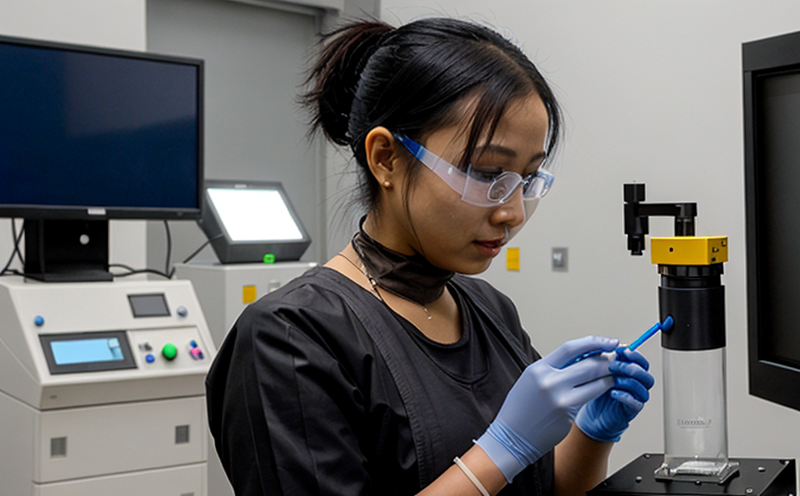ASTM E1131 Thermogravimetric Analysis of Nanomaterials in Environmental Samples
The ASTM E1131 standard is a critical tool for the quantitative determination of nanomaterials in complex environmental samples. This method specifically targets the thermogravimetric analysis (TGA) technique, which measures the change in mass of a sample as a function of temperature under precisely controlled atmosphere conditions.
The primary purpose of this service is to help entities ensure compliance with regulatory requirements and to provide scientific insights into the behavior of nanomaterials in environmental contexts. This analysis can be crucial for understanding the stability, reactivity, and potential risks associated with these materials in various ecosystems.
Thermogravimetric analysis has been widely recognized as a robust method for characterizing thermal properties and mass changes during heating or cooling of samples. In the context of nanomaterials, TGA can provide information on decomposition temperatures, oxidation behavior, and weight loss upon exposure to different atmospheres.
The ASTM E1131 standard is particularly useful for its ability to differentiate between various types of nanomaterials based on their thermal stability. This differentiation is essential in environmental studies where the presence of multiple components can complicate analytical outcomes. By using this method, laboratories can isolate and identify specific nanomaterials within a complex mixture.
The test procedure involves several critical steps that ensure accurate results. Specimen preparation is crucial as it directly impacts the outcome of the analysis. Samples are typically prepared by dispersing the nanomaterial in a suitable solvent or matrix, followed by drying and weighing before being placed into the TGA instrument.
Instrumentation plays a pivotal role in this process. The TGA instrument used for ASTM E1131 is highly sensitive and capable of providing precise mass measurements over a wide temperature range. This allows for detailed observation of the thermal behavior of nanomaterials, including subtle changes that might indicate specific chemical reactions or phase transitions.
The reporting process adheres strictly to ASTM E1131 guidelines, ensuring consistency and accuracy in presenting results. Reports typically include raw data such as mass versus temperature curves for each sample tested, along with calculated parameters like onset temperature, peak temperature, and total weight loss. These details are invaluable for further analysis and interpretation.
| Standard | Description |
|---|---|
| ASTM E1131-20 | Standard Practice for Thermogravimetric Analysis of Nanomaterials in Environmental Samples. |
| ISO 18743:2015(E) | Nanotechnology—Quantitative characterization of nanomaterials by thermogravimetry. |
Benefits
- Educational insights into the thermal behavior and stability of nanomaterials.
- Compliance with international standards for environmental testing.
- Precise identification and quantification of nanomaterials in complex samples.
- Risk assessment by understanding potential interactions between nanomaterials and their environment.
- Enhanced decision-making through accurate characterization data.
- Support for regulatory compliance programs aimed at environmental safety.
Eurolab Advantages
Our commitment to excellence in nanomaterials testing is reflected in our state-of-the-art facilities and highly qualified personnel. We utilize the latest TGA equipment, ensuring accurate and reliable results that meet or exceed ASTM E1131 standards.
We offer a comprehensive suite of services tailored to your specific needs, from initial consultation to final report generation. Our team of experts can provide guidance on sample preparation, interpretation of results, and assistance with any regulatory requirements you may encounter.
Our clients benefit from our deep industry knowledge and extensive experience in nanomaterials testing. We are dedicated to delivering high-quality services that contribute to the success of your projects and initiatives.





